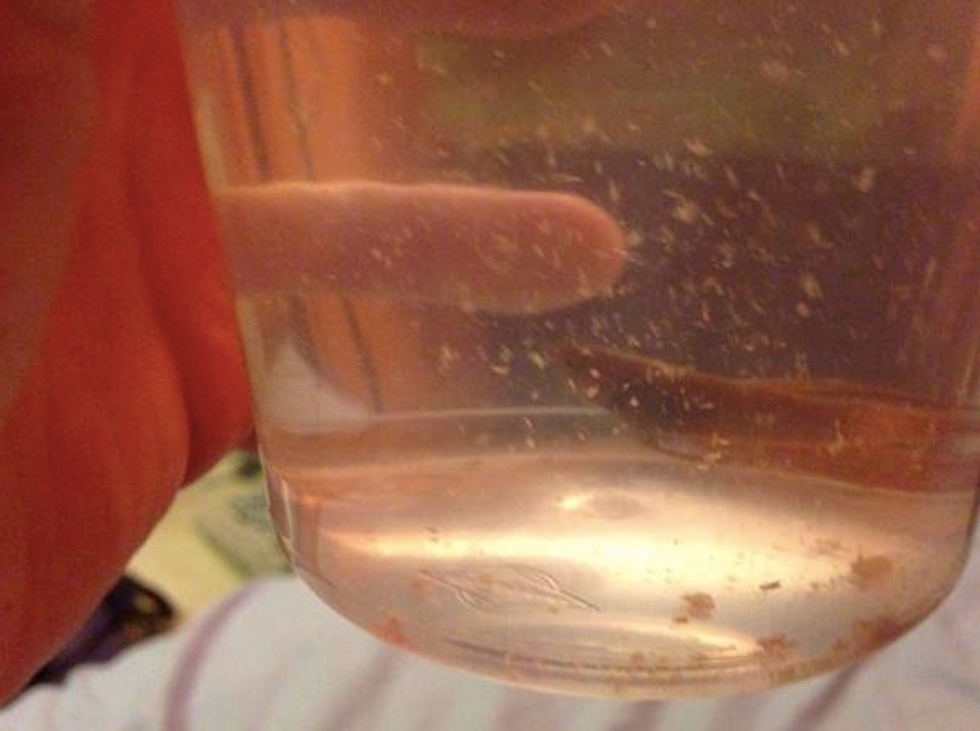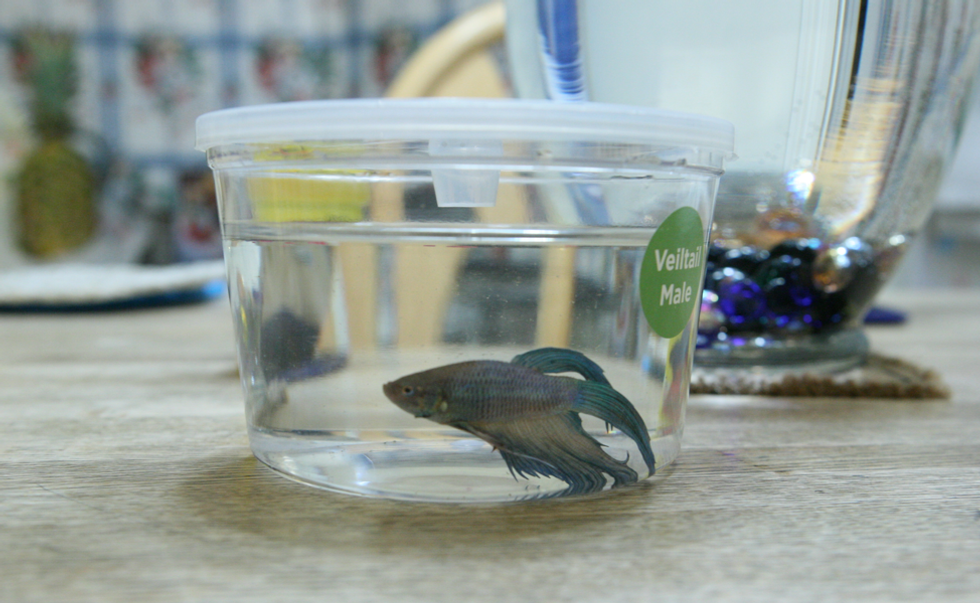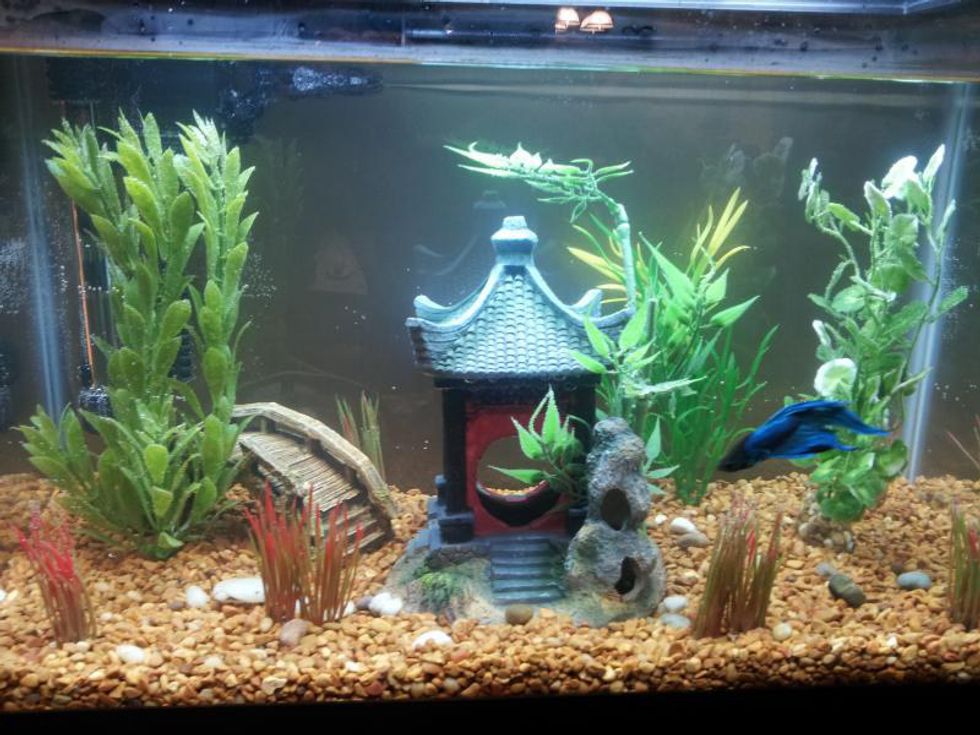When it comes to Betta fish, many people think that this particular breed doesn't require the maintenance that other fish do. Contrary to popular belief these fish need to be bought with proper care and preparation in mind. Even if a plethora of research is done, it isn't obvious if the Betta you're about to provide a home for was taken care of. What I'm about to write isn't an attempt to deter anyone from buying a Betta. Rather, it's to inform potential Betta parents that their adopted Betta requires an active measure of love and care, as Betta's need about as much maintenance as any other pet. This is also a call for pet stores to take better care of their Bettas.
It's disheartening to walk into pet supply chains that sell fish and see the poor conditions that Bettas are kept in. In one of the stores I visited the water in every cup was a dark yellow with a majority of the Bettas sick with diseases such as "ick" and "fin rot." In another store some had died and were simply pushed to the back of the shelf. A number of cups were placed right next to each other, which is bad for other Betta males because of their aggression toward one another.
Recommended for you
The method in which they're held for display is too small a living space with containers slightly larger than the size of my fist. A 2.5 gallon tank is changed weekly to remove waste products from the water, so it's hard to imagine how much waste is accumulated in a small plastic cup within 24 hours. If the water is changed it might not have been tested at the proper temperature, shocking the Betta from the heat change and placing stress on its immune system. If the conditions that the Betta was kept in were poor, you might not be able to tell that anything was amiss if that water was changed the day you went to look at them.
To the inexperienced eye many future fish moms and dads wouldn't notice the symptoms of numerous diseases that Betta's can carry due to poor water quality. The black coloring on their fin might look appealing at first, until it starts spreading and eats away the fin in what's known as "fin rot." White dots or gray scales on the Betta's body are tell-tale signs of a parasitic infection called "ick." A Betta's body may look to be covered in fine gold or rust colored dust, which is a disease called "velvet." The list continues on from obvious external symptoms to not-so-obvious internal maladies.
All of these infections and illnesses can be easily prevented by proper treatment. Bettas are tropical fish, requiring constant temperatures of between 76-82 degrees Fahrenheit. Just like any other fish, they need water changes with water conditioner. In a 2.5 gallon tank it's recommended to change the water every week when it's unfiltered. Everything a Betta fish does, from the food that remains in the tank, the waste it produces, the oxygen it recycles in the water and certain bacteria in the tank produces nitrates and ammonia that are poisonous to the Betta. Nitrates and ammonia strain a Betta's immune system and allow for all of these infections and diseases to take place.
While Bettas are amongst the most popular fish breed to buy (alongside the goldfish) it isn't apparent how often they are sold in large pet supply stores. Their ages aren't labeled and so you could be buying a Betta near the end of its life. A Betta's journey to the store shelves might be harrowing, placing undue stress on them and drastically increasing their chance to fall ill.
Some people aren't passionate for fish and may simply shrug at these kinds of issues that store Bettas face. After all, they aren't a cat or dog, but a small creature that doesn't have much of a personality, right? On the contrary, Bettas have emotions and differing personalities like any other pet. They recognize their caretakers, can learn tricks, and have little quirks that make them special. Bettas are also entirely dependent on their caretaker for survival, which makes dedication and vigilance to their well-being all the more pertinent.
A Betta mom or dad will form a bond with their adopted Betta and it's very disheartening when it becomes sick. Adults might have an easier time coping with the loss of their Betta, but the impact is farther reaching for the children whose parents buy them a Betta. If the Betta was sick before it was adopted, a lot of inexperienced owners won't notice until it's too late and the Betta passes on within a few weeks of ownership.
Because of the stigma that Bettas are invincible and incredibly easy to take care of most inexperienced buyers don't research into proper maintenance for their forever fish. This extends to pet supply chain employees, who unknowingly neglect their Bettas and cause their lives to be cut short from easily preventable diseases. Bettas are a joy to have as pets and it's a shame to see them be taken care of so poorly. They aren't invincible; they simply need the time, proper care and love that any other animal would be given.
For more information on how to properly take care of a Betta, click here:
For more information on the symptoms of Betta illnesses, click here:






















